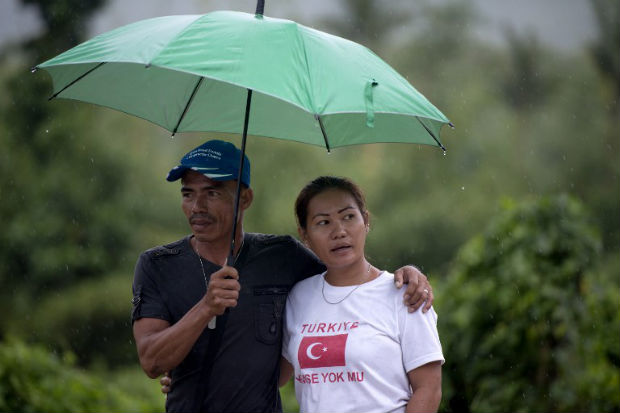Couple finds love, hope after misery from ‘Yolanda’
TACLOBAN, Philippines–After losing her husband and six children to the fury of Supertyphoon “Yolanda” (international name: Haiyan) Juvelyn Luana has found fresh hope among the misery and crushing poverty as she rebuilds her life with a new family.
Two years after the monster storm devastated the coastal city of Tacloban, killing thousands, Luana has a new partner, a new son and a shack far from the deadly shore.
“Having a husband and a baby gave my life direction,” the 32-year-old told Agence France-Presse as she scooped water into four grey drums to take to their brick and tin shanty that lacks tap water and electricity.
She fetches water from a distant swamp at night because her partner Joel Aradana, also widowed by Yolanda, works during the day and there is no one else to look after their five-month-old baby Jacob.
Built just 500 meters (yards) from a landfill, the shanty bakes under the tropical sun by day and the stench is overpowering.
Article continues after this advertisement“It smells like raw fish mixed with rotten food. I’m worried that my baby might get sick,” Luana told AFP during one recent humid evening.
Article continues after this advertisementA few plastic chairs, a gas stove and a tiny solar-powered television set that works only in daytime are the sum of the couple’s possessions.
Unable to afford even a bed, they sleep on a straw mat laid out on the floor.
Pictures of their former spouses and children who perished in the storm hang from the wall, beside a picture of the new couple being interviewed on local television that featured their unconventional love story.
Outside, children played noisily with their pet dogs and elderly women traded gossip on their doorways.
‘Life is very difficult’
But the couple can consider themselves among the lucky ones.
They were among the first 929 families to get new homes from the government, which is still struggling to shelter more than a million people displaced by the deadliest known typhoon to have struck the Philippines.
READ: ‘Yolanda’ death toll continues to rise 4 months after disaster
Yolanda smashed already impoverished fishing and farming communities in the central islands on November 8, 2013, leaving 7,350 people dead or missing.
A 150-billion-peso ($3.2-billion) government plan to build 205,128 new homes by 2017 in devastated areas, along with roads, bridges and classrooms has crawled under the weight of a cumbersome bureaucracy.
Thousands of the less fortunate survivors still live in cramped palm-thatch and wooden temporary shelters.
READ: Painfully slow rebuild after ‘Yolanda’
Though opportunities are scarce, Luana’s partner gets occasional carpentry work that pays P350 ($7) a day.
“We are OK, rebuilding our lives slowly,” she said.
“One look at Jacob every night and all my body aches disappear.”
“But life here is very difficult.”
The couple hopes to marry as soon as Aradana secures a death certificate for his wife, whose body was among hundreds that have not been found.
Luana said she gets no sleep at night fanning her son while Aradana rests his aching body after long hours at work.
Like many other Yolanda survivors, Luana said aid has not come fast enough.
A promised government loan she had been counting on to start a small business selling rice from her home has not been given.
A third of Aradana’s pay is spent on the 18-kilometer (11-mile) commute to the city where he works, leaving them with barely enough to buy rice and sardines.
“I want to help my husband. He doesn’t always have construction jobs so we need a steady source of income,” said Luana, a high school graduate, who used to give manicures and massages to her neighbors.
“I also want to buy a television set. My neighbors are crazy about soap operas but I want to know when the next typhoon is coming so I can prepare.”
